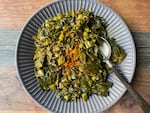OPB’s “Superabundant” explores the stories behind the foods of the Pacific Northwest with videos, articles and this weekly newsletter. To keep you sated between episodes, we’ve brought on food writer Heather Arndt Anderson, a Portland-based culinary historian and ecologist, to highlight different aspects of the region’s food ecosystem. This week she shares some tidbits of Northwest food news and a recipe for West African-style callaloo.
Click here to subscribe. For past issues, go here.

opb / OPB
We’ve got a lot of new things cooking up in the Superabundant kitchen this week, so we’ve got a shorter newsletter of small bites to tide you over until next week’s entree. There’s also a nutritious and flavorsome recipe for callaloo, a West African dish to keep you healthy through the end of Black History Month. We’re using winter greens in our version, but what type of greens are traditionally used for callaloo? Read on to find out!
Small Bites: A veritable buffet of food news nibbles
Freshly picked morsels from the Pacific Northwest food universe:
Let the good times roll.
Mardi Gras starts Feb. 21 with Fat Tuesday (also known as Shrove Tuesday or Pancake Day), a day when eating greasy food is practically a requirement. If you’re looking for ways to taste the Carnival celebration, try our steelhead po’boy recipe, Cajun-Creole soul food joints like Po’Shines Cafe De La Soul and Poboyz Cajun Creole Kitchen, or any of the Viet-Cajun seafood spots around the Northwest. If you’re looking for king cake, NoLa Donuts is sadly no longer an option, but Petite Provence offers individual size king cakes as well as full-size cakes made to order. Laissez les bons temps rouler!
We’ve got the dirt on how to fight climate change.
We’ve said it before, and we’ll say it again: soil is really important. A new study published by Oregon State University reveals that it’s not the mineral content or temperature that dictates how much carbon a soil can store; it’s the moisture. The total carbon stored in soils is estimated to be around 2,500 gigatons — more than the carbon found in the atmosphere, and second only to the ocean. This new study complements other recent studies about the importance of Pacific Northwest forests in combating climate change through carbon sequestration. Stay tuned for more soil stories next week, including the next episode of Superabundant!
OLCC director goes from top shelf to rock bottom.
Top managers at the Oregon Liquor and Cannabis Commission recently came under fire when it was revealed they’d been hoarding the good stuff for themselves, as reported by OPB’s Lauren Dake. After the ensuing public outcry, the OLCC’s executive director Steve Marks resigned from his post. Craig Prins, inspector general for the Corrections Department, will be taking his place in the interim. Normally, bottles of rare, high-end bourbons like Pappy Van Winkle are only able to be purchased through a lottery.
New wastewater regulations rock Oregon food carts.
As recently reported by Eater Portland, when Oregon’s food cart wastewater disposal regulations were written three decades ago, the state was home to just a handful of carts. Spots like Honkin’ Huge Burritos, No Fish! Go Fish! and the small pod at Portland Saturday Market were always intended to be mobile, and the rules around wastewater reflected that. In 2020, the regulations were updated to address the very different food cart landscape, and in January, the three-year grace period that went into effect with the updates officially ended. The only problem is that most food cart owners had no idea of the updates in the first place, so now they’re scrambling to either pony up for the upgrades to their wastewater system, move to a pod hooked to the sewer or shutter entirely. Looks like Oregonians might have to look elsewhere for a dirty water dog.
A-maize-ing new corn varieties coming soon.
Just in time for National Tortilla Chip Day (Feb. 24) the Organic Seed Alliance in Chimacum, Washington, is helping plant scientists breed faster-growing corn varieties for our shorter Pacific Northwest growing season. Best of all, artist Nhatt Nichols created a wonderful comic about it for Civil Eats. Northwest farmers have been eager to begin trials of corn varieties suitable for tortillas, which could mean more of the organic corn in our tacos and chips could be locally sourced in the not-too-distant future. As opposed to sweet corn, which we eat straight from the cob or in frozen niblets (and which grows here just fine), the corn we use for masa comes from field corn. Stay with us for the Corn episode of Superabundant, coming this spring.

West African style callaloo made with collard greens
Heather Arndt Anderson / OPB
Recipe: Collard Callaloo
It’s still very much winter, and that has us craving creamy greens like a buttery kale gratin. In Germany, seven-herb soup (Sieben Kräutersuppe) is a pretty standard dish for Maundy Thursday (aka Green Thursday, or Gründonnerstag), and creamed spinach is par for the course in New Orleans. And then there’s callaloo: the gingery, spicy, and coconut-creamy West African root of Southern style greens which came straight from enslaved Africans and Caribbeans. The dish traditionally uses any of a variety of greens including pokeweed, water spinach or amaranth, but taro leaves are the most standard. You can find these in the freezer section of most international grocery stores, but we’ve subbed winter greens that are available already washed, chopped, and bagged. If you can find them, smoked chicken thighs are a great addition here, but this is perfectly satisfying as a vegan dish. Makes 4 servings.
Ingredients:
2 tbsp coconut oil or vegetable oil
½ cup chopped onion
4 cloves garlic, minced
1 Scotch bonnet chile or habanero, seeded and minced
2″ knob of ginger, peeled and finely chopped
1 cup coconut milk (not the kind for drinking)
1 Maggi cube or 1 tsp bouillon
1 tsp fine sea salt
1 tbsp curry powder
1 lb collard greens, washed and chopped
2 smoked chicken thighs, optional
Steamed basmati rice for serving
Instructions:
- Heat the coconut oil in a large pot over medium heat. Sauté the onion, garlic, chile and ginger, stirring occasionally, until the onion becomes glossy and translucent, about 5 minutes.
- Add the coconut milk, the Maggi cube or bouillon, the salt and the curry powder, and stir until the cube is dissolved. Add the greens and stir to coat in the coconut curry, then add ½ cup of water and put a lid on the pot. (If you’re including smoked chicken thighs, add them to the pot now.)
- Reduce the heat to medium low and simmer for 20 minutes, or until the collards are tender. Adjust seasoning as needed, then serve with rice.
The Superabundant newsletter comes out every Friday. Click here to subscribe.


